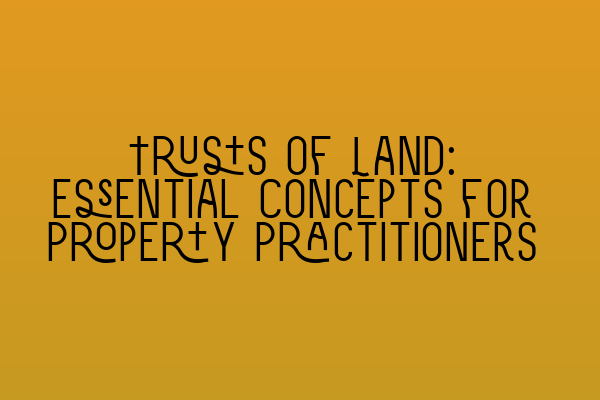Trusts of Land: Essential Concepts for Property Practitioners
As a property practitioner, it is crucial to have a comprehensive understanding of trusts of land. This area of law plays a significant role in property transactions, especially when there is co-ownership or a need to protect the interests of beneficiaries. In this article, we will explore the essential concepts of trusts of land and delve into their implications for property practitioners.
What is a Trust of Land?
A trust of land is a legal arrangement where the legal ownership of a property is held by one or more trustees for the benefit of one or more beneficiaries. It arises when two or more parties jointly own a property and have agreed to hold it in trust for specific purposes. The trust is established by either an express declaration or by operation of law, such as in cases of resulting or constructive trusts.
Types of Trusts of Land
1. Express Trusts
Express trusts are created by a deliberate declaration of the settlor’s intention to create a trust, usually through a written document such as a trust deed or a will. In the context of land, express trusts are commonly found in situations where parents transfer their property to trustees for the benefit of their children or family members.
2. Resulting Trusts
Resulting trusts arise when legal ownership of a property is transferred to another person, but the beneficial ownership remains with the transferor or someone else. These trusts are often created when a property is purchased in the name of one party, but another party contributes financially to the purchase. Resulting trusts can also arise when the legal owner fails to fully testify his or her intention regarding beneficial ownership.
3. Constructive Trusts
Constructive trusts are imposed by the court to prevent unfairness or unjust enrichment. They are not based on the parties’ intentions but are created to remedy a legal or moral wrong. In the context of trusts of land, constructive trusts often arise when one party has made financial or non-financial contributions to the property with the expectation of acquiring a share of the beneficial ownership.
Duties and Powers of Trustees
Trustees of land have several duties and powers that property practitioners need to be aware of. Some of the key duties include:
1. Duty of Care and Skill: Trustees are obligated to act with reasonable care and skill in managing the trust property. Professional trustees are held to a higher standard of care.
2. Duty of Loyalty: Trustees must act in the best interests of the beneficiaries and avoid any conflicts of interest.
3. Duty of Impartiality: Trustees must act impartially towards all beneficiaries, ensuring that their interests are balanced and fairly represented.
4. Duty to Account: Trustees have a duty to keep accurate records of all transactions and provide regular accounts to the beneficiaries.
In addition to these duties, trustees have certain powers that enable them to manage and administer the trust property. These powers may include the power to sell, lease, or mortgage the property, subject to any restrictions or conditions specified in the trust deed or by applicable law.
Implications for Property Practitioners
For property practitioners, an understanding of trusts of land is essential for navigating complex co-ownership arrangements and advising clients on potential disputes or claims. It is crucial to consider the implications of trusts of land when dealing with joint purchases, family transfers, or any situation involving multiple owners.
In practice, property practitioners may be faced with various scenarios, such as:
1. Advising clients on the creation and administration of trusts of land, including drafting trust deeds and ensuring compliance with legal requirements.
2. Dealing with disputes between co-owners or beneficiaries, which may involve applications for the sale or partition of the property.
3. Conducting due diligence to identify any existing trusts, resulting trusts, or constructive trusts that may affect the property’s legal and beneficial ownership.
By staying up-to-date with the latest developments in trusts of land and maintaining a strong understanding of the legal principles and case law in this area, property practitioners can effectively navigate these complex situations and provide the best possible advice to their clients.
Conclusion
Trusts of land play a vital role in property law and have significant implications for property practitioners. Whether you are dealing with co-ownership arrangements or advising on trusts involving family members, understanding the key concepts and legal principles of trusts of land is essential.
To further enhance your knowledge and preparation for the SQE exams, consider exploring our related articles and resources:
– SQE 1 Practice Exam Questions
– SQE 1 Practice Mocks FLK1 FLK2
– SQE 2 Preparation Courses
– SQE 1 Preparation Courses
– SRA SQE Exam Dates
Expand your knowledge and improve your skills to excel in your property law practice. With a strong foundation in trusts of land, you can confidently navigate the complexities of co-ownership arrangements and provide expert advice to your clients.
